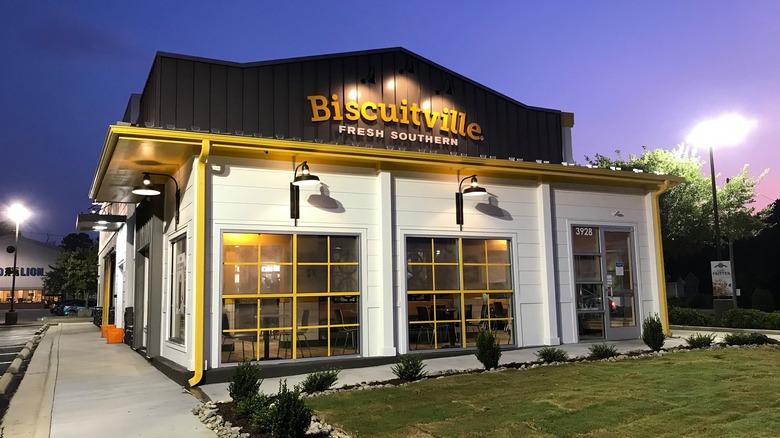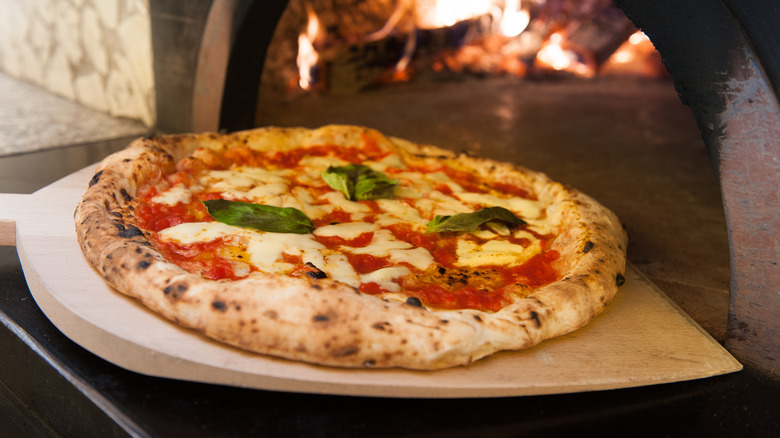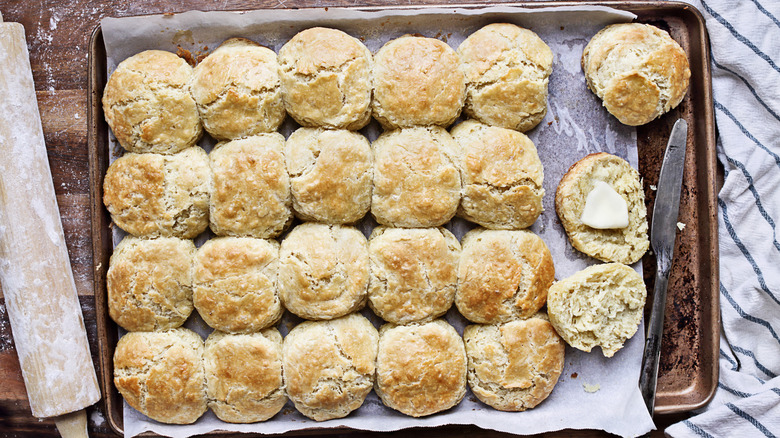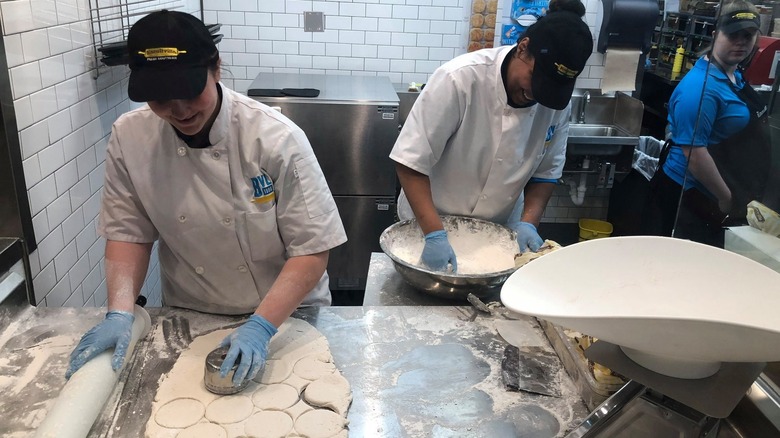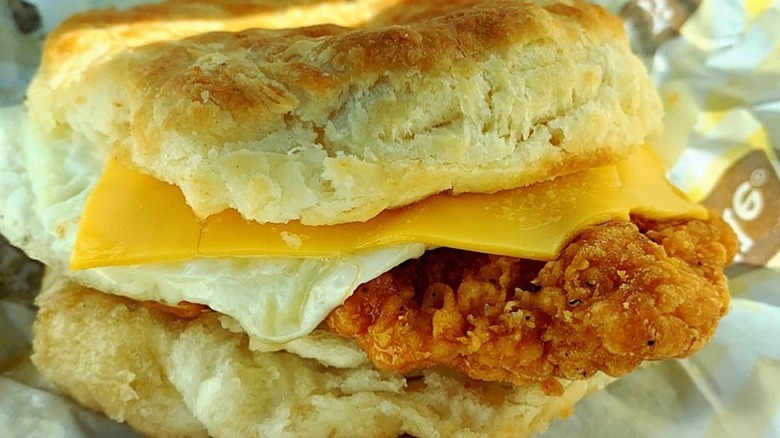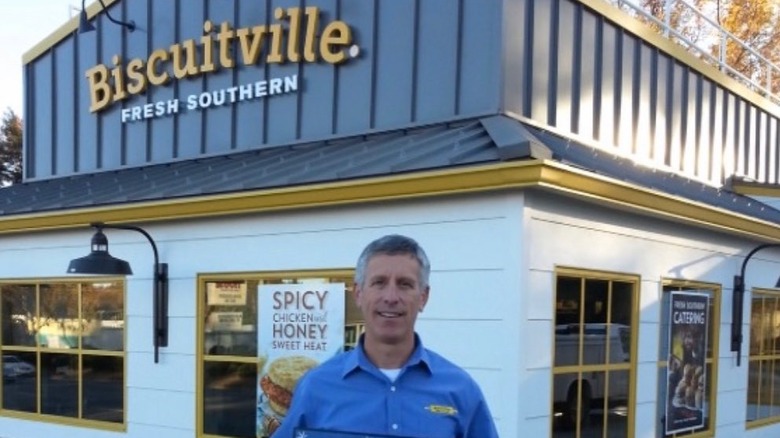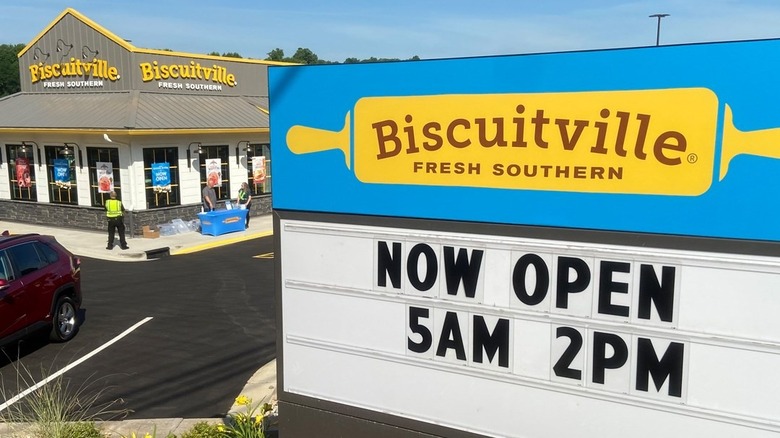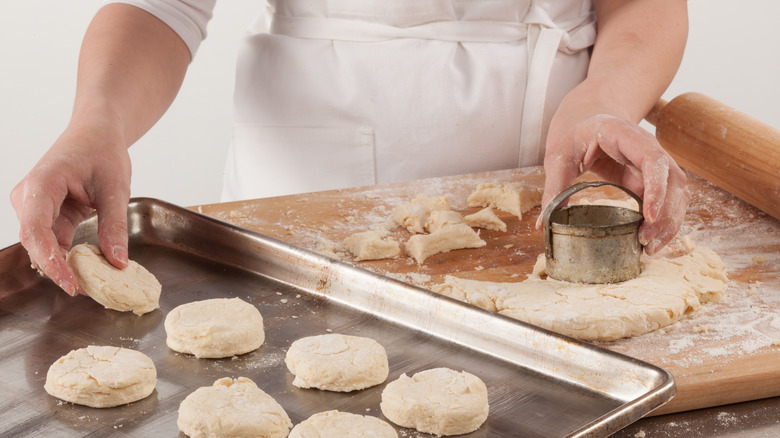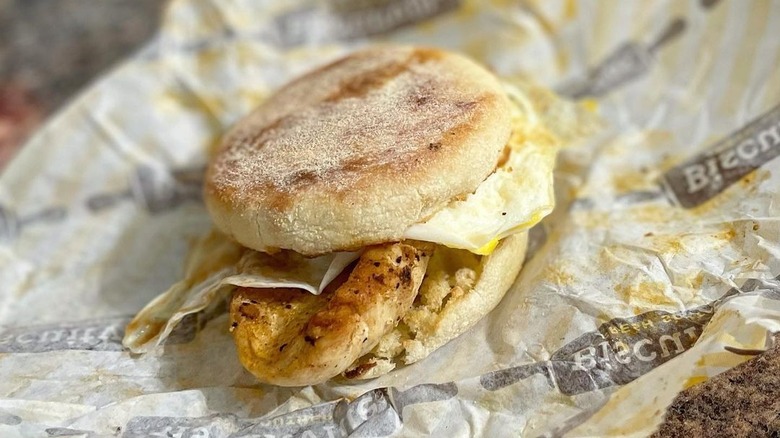The Untold Story Of Biscuitville
We may receive a commission on purchases made from links.
You've probably heard of KFC, Church's, and Popeyes. These players in the fast food industry are known for their mouthwatering fried chicken and buttermilk biscuits. But there's another breakfast staple dishing out buttery Southern-style biscuits, and that's Biscuitville. While the Southern belle may not have the name recognition of its biggest competitors, the Biscuitville's freshly made biscuits are unparalleled; in fact, they're featured prominently in most of its menu items, whether you order the brand's signature bacon, egg, and cheese biscuit or one of its less traditional offerings, such as the spicy chicken and honey biscuit.
A unique aspect of Biscuitville's menu is its emphasis on fresh, locally and regionally sourced ingredients — a rarity among fast food companies. Biscuitville also prides itself on being a privately held and family-owned company. Although it's modest in size, with locations only in North Carolina and Virginia, is poised to grow in size — and popularity — in the future. Whether you're a longtime fan of Biscuitville's down-home cooking or this is the first time you're hearing about them, the company's rich history proves there's more to it than simply biscuits — no matter how delicious they are. Here's what you need to know about the untold truth of Biscuitville before you pay them a visit.
Biscuitville's secret recipe was shared on grandmother's death bed
Every family has its legends, but the lore behind Biscuitvile arguably takes the cake. The story goes that sometime in the mid-1960s, Irma Rue Bass, affectionally known as "Nanny," was on her deathbed when she called on her grandsons, brothers R.B. and Maurice Jennings, to help put her affairs in order, per Business North Carolina. According to family legend, she told her grandsons they could choose their inheritance: a small farm located near Murfreesboro, Tennessee, or her secret scratch-made buttermilk biscuits recipe. But the catch was that they could only pick one each. The farm went to R.B., while Maurice chose the recipe. And it would seem Maurice's choice paid off — literally.
The first Biscuitville opened its doors in Danville, Virginia in 1975, and the business has been wildly successful ever since. The company grew to 25 locations by 1982, all in North Carolina and Virginia, per Business North Carolina. Today, there are over 60 locations and the Greensboro-headquartered company's revenue exceeds $60 million per year, according to Triad Business Journal.
The alleged origin of the beloved Southern fast food chain isn't just clever marketing. Burney Jennings, who took over the role of CEO at Biscuitville from his father in 1996, swears the story is true.
Biscuitville started out as a pizza restaurant
Before there was Biscuitville, there was Pizzaville. Maurice Jennings, the founder, was a former flour salesman who launched two Mountainbrook Fresh Bread & Milk stores in Burlington, North Carolina in 1966. The stores later rebranded as Pizzaville, where he sold pizza and bread. By 1975, there were six restaurant locations in southern Virginia and the Piedmont region of North Carolina. But Jennings confessed to Greensboro News & Record in a 1997 interview that he "didn't know anything about pizza." He made a some blunders while in the pizza business; for example, he attempted to cut a pepperoni stick with a pocketknife.
Armed with his grandmother's biscuit recipe, Jennings decided to revamp the business, adding freshly baked biscuits to the menu. Customers loved the biscuits so much they showed up in droves each morning, with lines stretching out the door, according to the company website. Jennings decided to toy with his business plan even more and introduced a "jelly bar" loaded with jellies and jams for guests to slather on their biscuits. The jelly bar didn't stick around, but the biscuits continued to sell like crazy, outselling pizza pies, so Jennings fully pivoted from pizza to biscuits. In 1975, Pizzaville officially became Biscuitville.
Throughout his career, Jennings wasn't afraid to experiment. He briefly dabbled in a couple different dining chains, such as a pizza chain called Pie Works, as well as Burney's Hot Bagels, though the latter company closed the year after it opened.
The biscuits are made from scratch every 15 minutes
Biscuits are a breakfast staple in the South, found commonly in restaurants, fast food chains, and grocery stores across this swath of the country. So, what makes Biscuitville's menu so special? As the company's marketing manager Alon Vanterpool told The North State Journal in an interview in January, it comes down to the brand's high-quality ingredients and handmade process — a rarity among fast food chains. Don't get us wrong. We have a soft spot for fast food, including calorie-heavy meals loaded with salt, sugar, and processed chemicals. But it isn't often fast food chains boast freshly made menu items sourced with high-quality ingredients. No wonder Biscuitville was voted one of the 10 best regional fast food chains in America.
In fact, the company motto is "Fresh Southern," and it isn't hard to see why. According to Vanterpool, "Biscuitville sets itself apart from other restaurants by making scratch-made biscuits and baking them fresh every 15 minutes right in front of guests. Our biscuits are an original family recipe containing three main ingredients—flour, buttermilk and shortening—blended in perfect proportions, rolled out and baked by a team of master biscuit makers." Amazingly, the breakfast chain doesn't use microwaves. Relying on frozen biscuits might get the job done faster, but if Biscuitville's local popularity is any indication, the final product is worth the extra steps.
Biscuitville is also known as the "home of the biscuit window"
Of course, it's one thing for a fast food company to say their menu items are made with fresh ingredients. But how do customers actually know their food is being handled with care? Who can forget the infamous E. coli outbreaks across Chipotle restaurants in 2015 that stuck the Mexican food chain with a $25 million fine from the U.S. Food and Drug Administration and the Department of Justice? The irony was that Chipotle boasted fresh ingredients in comparison to competitors that relied on artificial ingredients.
Luckily, at Biscuitville, customers are unlikely to find themselves high-tailing it to the doctor's office shortly after consuming one of their meals thanks to the breakfast chain's "biscuit window." Inside every Biscuitville location, the brand's famous biscuits are mixed, hand-kneaded, rolled, and then cut into spheres behind a large glass window for customers to watch up close or from their seats (via USA Today). "If guests can see you making the biscuits, they know what they're eating just came out of the oven," Monise Hammond, who manages the Indian Trail Biscuitville, told Business North Carolina in a 2018 interview.
After the golden-brown biscuits are pulled out of the oven, customers can load them with toppings of their choice, from eggs, country ham, or sausage to butter and creamy gravy, according to the menu on the company website.
At Biscuitville, breakfast is the most important meal of the day
Founder Maurice Jennings realized early on that the bulk of Biscuitville's sales came from the breakfast crowd. In fact, 85% of their sales were made before 10 a.m., driven primarily — no pun intended — by customers zooming through the drive-thru window, per Our State. Today, more than 40,000 biscuits are sold each day across the chain's numerous locations (via Business North Carolina).
It isn't hard to see why breakfast is so popular. The bacon, egg, and cheese sandwich — one of the restaurant's best-selling favorites, according to the company website — boasts melt-in-your-mouth bacon that's griddled with homemade flair. Another fan favorite, the grilled chicken, egg, and cheese English muffin features all-natural chicken. Plus, it'll keep even the hungriest eaters full despite coming in at under 400 calories.
Even though breakfast has ruled the roost throughout the company's 50-year history, Biscuitville delved into lunch fare in 2014, now served at select locations, per Food & Wine. According to then-CEO Burney Jennings in a 2018 interview with Business North Carolina, the sales from the breakfast crowd still reign supreme, but the new menu items have nevertheless attracted diners during lunch.
The expanded lunch menu includes spicy fried chicken biscuits covered in sweet honey, as well as the fried chicken and jalapeno pimento-cheese biscuit. Let's not forget the Cackalacky Chop, a fried pork chop biscuit topped with coleslaw and a sweet sauce that marries spicy Cacalacky Sauce and Cheerwine soda. Sign us up.
Biscuitville is still family-owned
Biscuitville has been a family-owned company ever since Nanny Bass passed down her secret biscuit recipe to her grandson more than 50 years ago. Burney Jennings, the son of Biscuitville's founder, became the company's CEO in 1996, according to Business North Carolina. (Maurice Jennings, his father, passed away last year at the age of 86, per AP News). But Burney has been working at Biscuitville long before his rise to the CEO slot, mopping floors and cleaning restrooms at various locations since he was 16. Burney is also grooming his oldest son named Blake to take over the business one day.
Still, the fast food darling has branched outside the family tree. Earlier this year, Burney stepped down as CEO and became the executive chair, ceding the role to non-family member Kathie Niven, who joined the Biscuitville team in 2011, Nation's Restaurant News reported. Niven was promoted to president in 2018, and before that, she was the company's chief brand officer. Burney seems to have no regrets about handing over the reins to an outsider. "Kathie has tremendous passion and a deep knowledge of Biscuitville and its culture, and she's fully prepared to assume the role of Chief Executive Officer," the dining chain's former CEO said in a press release that announced her promotion.
Biscuitville is transparent about its ingredients
Biscuitville has a few slogans, most of which are emblazoned on the walls of each restaurant establishment, such "Fresh Southern" and "Authentic Southern" (via Garden & Gun). But one motto — "Farm to Drive-Thru" — is arguably the most attention-grabbing.
Most of us have heard of farm-to-table restaurants and cuisines, meaning dining that prioritizes locally sourced, farm-grown ingredients. But while farm-to-table is all the rage these days among traditional sit-down restaurants, it isn't often you hear fast food companies tout the same ethos. But as it turns out, Biscuitville demonstrated a commitment to local sourcing even before it was trendy, making the Southern brand remarkably different from other chains.
Biscuitville isn't shy about its decades-long partnerships with various local and regional suppliers, either. Each restaurant location prominently displays a list of where the company's ingredients come from (via Business North Carolina). Notably, a family-owned mill in Henderson, North Carolina has been milling and blending biscuit flour exclusively for the restaurant company since its founder was using dough to make pizzas at his Pizzaville eatiers in the 1960s, according to the company website. Every week, 40,000 pounds of flour is hauled to Biscuitville's Graham-based warehouse, and before that, the flour is tested in the mill's lab to ensure consistent flavor and quality.
From Biscuitville's eggs and country ham to pickles and pimento cheese, everything is locally or regionally sourced. Even the restaurant's coffee is roasted in North Carolina.
Biscuitville's founder was honored with a lifetime achievement award
Biscuitville does not have as big of a footprint as some of its competitors in the biscuit and fried chicken game. For example, Charlotte-based Bojangles, which has been around since 1977, has a whopping 330 restaurants in 14 states across the Southern swath of the country, most of them in North Carolina. Bojangles is also publicly traded, per QSR Magazine, whereas Biscuitville is privately owned. Hardee's, another fast food company known for its hand-breaded biscuits, and which launched in Greenville, North Carolina in 1960, boasts more than 1,800 stores in 14 countries, according to its company website.
Still, Biscuitville's cultural impact and popularity among customers can't be overstated. That's why the company's founder, Maurice Jennings, received a Lifetime Achievement Award in 2019 from the North Carolina Restaurant and Lodging Association (NCRLA) in honor of his demonstrated commitment to the food and restaurant business (via Triad Business Journal).
Jennings' entrepreneurial spirit has lived on even though he passed away in 2020 at the age of 86 (via Nation's Restaurant News). "Maurice's courage, tenacity and passion allowed him to defy the odds to build a successful family-owned business that remains stronger than ever after 54 years," said Biscuitville's then-president in a statement. "He built Biscuitville with a few simple principles: a commitment to great quality food, friendly people and food served fast."
Biscuitville values its employees
The fast-food industry is rife with horror stories about how big-name companies treat their employees. From wage theft and low pay to workplace injuries and poor working conditions, there's no denying that working in the food and restaurant industry has its rough spots. But Biscuitville stands out from the crowd for a couple of reasons. For example, although Biscuitville's fast food rivals, such as Bojangles and Hardee's keep the lights on well past dinnertime, Biscuitville's operational hours are limited to 5 a.m. to 2 p.m., serving its biscuit-based menu during breakfast and lunch only.
It's been that way since 1982 when Maurice Jennings, the company's founder, decided dinner wasn't cost-efficient. Plus, it was too much of a hassle to keep the food hot and fresh, his son told Business North Carolina. Even though customers can't satisfy any late-night Biscuitville cravings, this means the company's more than 1,800 employees get to enjoy more time with friends and family. According to the company website, Biscuitville also offers a range of other benefits for its employees, including vacation time and even tuition reimbursement.
There are copycat recipes online
Since Biscuitville doesn't operate outside its two-state market, those of you in other parts of the country might be wondering how to get your hands on the Southern fast food chain's famous biscuit-centric menu. Unfortunately, unless you're willing to drive or book a flight to North Carolina or Virginia, there isn't another way to taste the brand's buttery rich biscuits for yourself. Unlike some companies, Biscuitville doesn't ship its products outside its stores, either. But if you're up for some fun in the kitchen, there are a number of copycat recipes to be found online and in cookbooks from inventive bakers who've attempted to recreate the brand's signature buttermilk biscuit. Although they may not taste exactly like the genuine article, that doesn't mean they aren't worth a try. In fact, you might be pleasantly surprised by how tasty your creations turn out — and without having to step outside your front door.
Biscuitville has gone through some changes over the years
When you've been in business for as long as Biscuitville has — more than 50 years – at some point you have to mix things up. In 2014, after a few years of stagnant sales, the company decided to refresh its image to attract new and younger clientele (via FOX8).
In addition to pivoting to lunchtime fare, Biscuitville added other menu items, such as waffle sandwiches — bacon, cheese, eggs, or chicken squeeze between two slices of fluffy Belgian waffles instead of regular biscuits (via QSR Magazine). In an effort to add more healthy options to the menu, Biscuitville also expanded its menu to include lighter fare like grilled chicken and English muffins.
The rebrand also included a new and improved logo, featuring the chain's slogan "Fresh Southern" to spotlight the company's long history of partnering with local, family-owned producers and suppliers for its menu ingredients. In fact, more than 90% of Biscuitville's menu items include ingredients that are locally sourced.
Finally, all of the company's restaurant locations got a makeover. True to its Southern heritage, the exterior of remodeled and new Biscuitville stores feature a wooden façade that resembles a traditional barn, including a tin roof. Inside, the remodeled restaurants marry industrial hardware with mixed materials like stone, wood, metal, and tile that creates a modern but comfortable ambiance. Restaurants are also outfitted with modern technology like WiFi and flat-screen TVs.
Biscuitville has plans to expand
In the words of Food & Wine, Biscuitville "needs to be everywhere" because "It's ridiculously good." But just because there aren't currently Biscuitville locations outside North Carolina and Virginia doesn't mean there won't be one day.
For one, the demand has always been there. When Burney Jennings was the CEO, he told North Carolina Business he received several calls or emails every week from people interested in franchising the business. But the biscuit-focused company has been hesitant to franchise or otherwise rapidly expand. "When you franchise, you lose control of quality," said Jennings. To be sure, Biscuitville's small-town, homegrown feel is part of its charm.
In recent years, Biscuitville has started laying the groundwork to expand, mostly in Charlotte, according to Charlotte Business Journal. Despite COVID-19, the Southern fast food chain plans to add six restaurants in the North Carolina city, if not more, within the next 10 years. Overall, Biscuitville hopes to reach 100 stores total in the next five years, with expansion expected to even occur in new states, namely South Carolina and Georgia. With some patience, the restaurant company may very well be available nationwide in the future.
